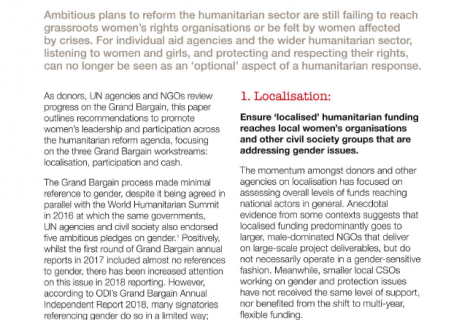
Ambitious plans to reform the humanitarian sector are still not reaching grassroots women’s rights organisations and women affected by crises. For individual aid agencies and the wider humanitarian sector, listening to women and girls and protecting and respecting their rights can no longer be considered an ‘optional’ aspect of a humanitarian response.
As donors, UN agencies and NGOs review progress on the Grand Bargain, this paper outlines recommendations to promote women’s leadership and participation across the humanitarian reform agenda by focusing on the three Grand Bargain workstreams of localisation, participation and cash.
The Grand Bargain process made no minimal reference to gender, despite being agreed in parallel with the World Humanitarian Summit in 2016 where the same governments, UN agencies and civil society endorsed five ambitious pledges on gender. The first round of Grand Bargain reports in 2017 made almost not reference to gender and the 2018 reports were more encouraging. But many signatories’ gender references are still limited to reporting basic actions such as updating institutional policies or guidance on disaggregating gender in needs assessments.
ActionAids know that much more can and should be done. This report outlines recommendations to governments, UN agencies and NGOs on to support gender work and the specific steps that CARE International and ActionAid will make to support wider efforts.